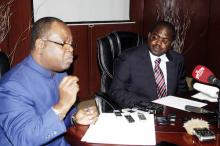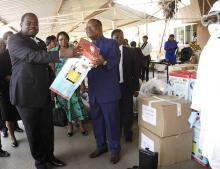World Health Organization donates supplies for ebola preparedness and response to the Ministry of Health
LUSAKA, 27th August 2014 - The Ebola outbreak in West Africa and in the Democratic Republic of Congo constitutes an “extraordinary event” and a public health risk to other states. The WHO Country Office donated a consignment of assorted supplies to the Ministry of Health to strengthen the national preparedness in case of an outbreak of Ebola Virus Disease (EVD) in the country. The donated items include: complete Personal Protective Equipment kits; hand sprayers; back pack sprayers; gumboots; plastic aprons; face shields; gloves; sharp boxes; ethanol; and biohazard bags.
In his statement when handing over the donated items, the WHO Representative a.i. Professor Jean-Marie Dangou commended the government of the Republic of Zambia for demonstrating leadership and commitment in putting in place containment measures for EVD in case of an outbreak. He stated that the actions which were being taken by government were in accordance with the WHO International Health Regulations (2005), which provides recommendations for the control of international spread of disease across borders. Professor Dangou said that the current outbreak of Ebola in West Africa which had affected Guinea, Liberia, Nigeria, and Sierra Leone was the deadliest in history and that the possible consequences of further international spread were particularly serious in view of the virulence of the virus. He urged government to strengthen preventive and response measures to protect the general populace and the health workers and to ensure that the health care system was prepared to detect, investigate, and manage Ebola cases. He also emphasised the importance of having assured access to a qualified diagnostic laboratory for EVD and capacity to manage travelers suspected to have EVD originating from known Ebola-infected areas who arrive at international airports or major border crossing points.
Professor Dangou said that WHO was donating to the Ministry of Health because in the event of an outbreak, it was essential that adequate supplies were maintained to ensure that sufficient medical commodities, especially Personal Protective Equipment, were available to those who appropriately need them, including health care workers, laboratory technicians, cleaning staff, burial personnel and others that may come in contact with infected persons or contaminated materials. He commended government for developing the national EVD response plan and assured government that WHO remained committed to supporting the development and implementation of the key measures particularly infection prevention and control , community awareness, surveillance, accurate laboratory diagnostic testing and in case of an outbreak, contact tracing and monitoring, case management, and communication of timely and accurate information.
The Deputy Minister of Health, Dr. Chitalu Chilufya thanked WHO for partnering with government in strengthening the national response particularly for the pre-epidemic phase. He stated that government was aware of the threat and risk of an outbreak in the country and was treating the Ebola outbreak as a Public Health Emergency. He said that the Minister of Health had signed a Statutory Instrument to make Ebola Virus Disease a notifiable disease in Zambia in line with the provisions of section 29 of the Public Health Act. The Minister stated that government had also put in place a number of measures to prevent an outbreak of Ebola which included; deployment of health workers at border points to conduct screening of visitors particularly those coming from affected countries and those who were considered to have signs similar to Ebola; heightened surveillance, restricted travel to and from countries which are affected by the outbreak; purchase of Personal Protective Equipment, infra-red thermometers and network fever scanning systems for installation at major airports; engagement of the media to enhance communication and development of health education materials. Dr. Chilufya also emphasized that government was tightening the surveillance system at border points with the Democratic Republic of Congo considering the ongoing outbreak of EVD in that country.
According to a WHO update made on 25th August, there were more than 2635 EVD cases and 1439 deaths reported in West Africa. Between 19 and 20 August a total of 142 new cases and 77 deaths were reported from Guinea, Liberia, Nigeria and Sierra Leone. According to WHO International Health Regulations Committee on the Ebola outbreak in West Africa, this outbreak is now considered a Public Health Emergency of International Concern (PHEIC). The latest statistics also indicate that a total of 240 health workers have developed the disease in the four countries and 120 have died. More recently, the Democratic Republic of Congo has also reported an outbreak of Ebola Virus Disease different from the one in West Africa.
- (L-R) The WHO Representative a.i. Professor Jean-Marie Dangou giving a statement at the handover ceremony in the presence of the Deputy Minister of Health, Dr. Chitalu Chilufya
- The WHO Representative a.i. Professor Jean-Marie Dangou (right) handing over the donated items to the Deputy Minister of Health, Dr. Chitalu Chilufya.
_____________________________________________
For more information, please contact:
WHO Country Office, UN ANNEX BUILDING
Plot 4609, Corner of Andrew Mwenya and Beit Roads Rhodes Park
P.O. Box 32346, Lusaka, Zambia.
Nora Mweemba, Health Information and Promotion Officer.
E-mail: mweemban [at] who.int (mweemban[at]who[dot]int)
GPN: 37609
Tel No 00-260-211-255 398 / 255 336 / 255 322
Mobile : 260 - 977873976
Fax: 00-260-211-252863
Dr. Peter Songolo, Disease Prevention and Control Officer
E-mail: songolop [at] who.int (songolop[at]who[dot]int)
GPN: 37640
Tel No:00-260-211-255 398 / 255 336 / 255 322
Mobile : 260 977–38 66 00
Fax: 00-260-211-252863




